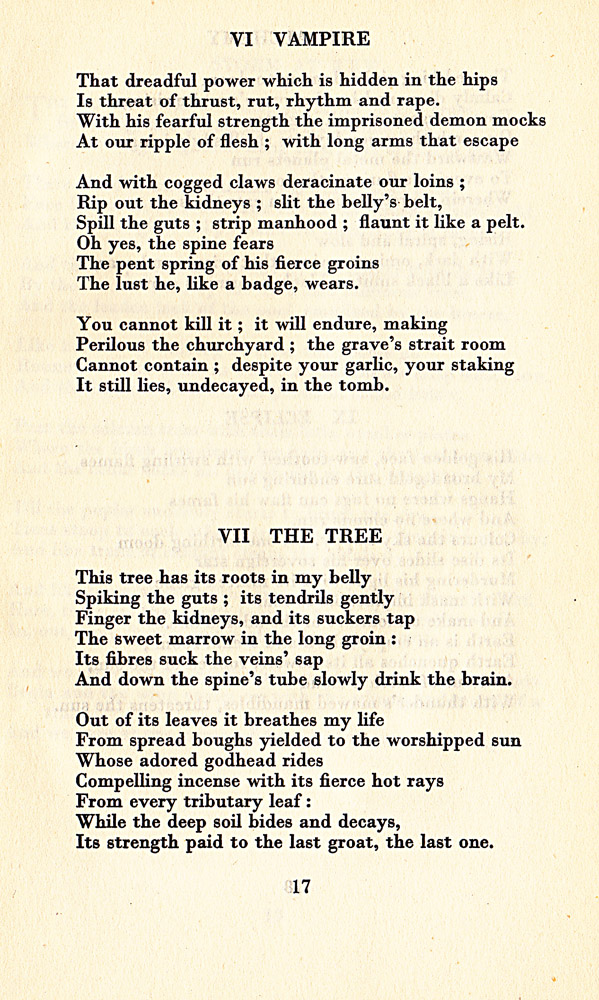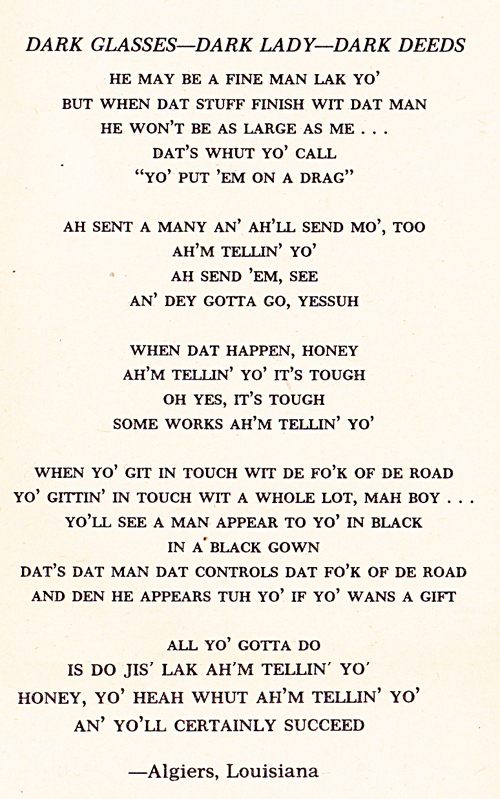Today’s poem needs no lengthy introduction, it is perhaps the classic of poetry of the macabre. Ladies and gentlemen, The Raven!



…being an exploration of mid-20th Century horror paperbacks and assorted oddities.

Today’s poem, or series of poems, comes from a book I picked up from a junk shop a few months back; a collection of poems by John Sibley, called The Death of William Rufus. This was published in 1946 by the notorious small press, The Fortune Press.
The Fortune Press was founded in 1924 by Reginald Caton. It seems that Caton had no qualms about publishing copyrighted works through his own press, which led to Francis Meynell of Nonesuch Press calling Caton a “Thief and a pirate”.
Caton courted further controversy by using The Fortune Press to publish homoerotic fiction, which led to him being prosecuted on obscenity charges in 1934. After this he concentrated more on publishing poetry and went on to publish Dylan Thomas and Philip Larkin (in 1966 Larkin is said to have described Caton as “…a bum-hunting relic of the 1920s”).
As we can see from this series of poems, which contain some rather choice and fruity passages, Caton may have been continuing to publish works on his favoured theme by masking them in metaphors.
And if you would like to have your own poetry featured here in The Churchyard then feel free to get in touch. Details can be found . . . HERE.





We couldn’t have a series of poems from the darker side of the spectrum without this particular poet, could we?
Ladies & Gentlemen, I give you the Don of Decadence; the Grand-Père of the Grotesque; the Sire of Splenetics. Yes, it’s Monsieur Fleur du Mal, himself ~ Charles Baudelaire!
And if you would like to have your own poetry featured here in The Churchyard then feel free to get in touch. Details can be found . . . HERE.

One of my own today; this was previously published in DANSE MACABRE and an anthology called CORPSE ROADS.
This one has a rather peculiar and somewhat disturbing back-story. In the summer of ’76 I was seven years old. A girl lived a few streets away from me, her name was Susan Giles, I didn’t really know her as she was two or three years older than me and lived in the slightly posher houses which bordered our council estate. Obviously, being very young at the time, the actual events are just on the edge of my memory and a little sketchy as the event unfolded to me from the overheard conversations of adults and the chattering gossip of the other children in the area.
But, the basic facts are that Susan Giles was walking to a friend’s fancy-dress birthday party dressed as Little Red Riding Hood. She never arrived at the party as a man named Michael Ireland dragged her into one of the garages that lined a nearby alleyway. When Susan Giles’ body was found in the garage she had been abused, she had bite marks on her body and an attempt had been made to set her on fire.
Obviously this had a profound effect me at that age, being the first time that I can remember the monsters crawling out from the pages of the books.
And if you would like to have your own poetry featured here in The Churchyard then feel free to get in touch. Details can be found . . . HERE.

There are a handful of books on my poetry shelves which I often pick out and browse through. These tend to be ones that inspire me, ones that seem to tap into differing sides of my own personal mythology; these include Simic’s translations of Vasko Popa; John Burnside; Billy Chyldish; and Helen Ivory.
So, today I’m delighted to include two poems from Helen Ivory’s 2010 collection, The Breakfast Machine. What appeals to me most about this collection is how Ivory twists the world a fraction of a degree so that we look at it with a skewed perspective; it’s reminiscent of Czech Surrealism where the folkloric becomes everyday and the inanimate becomes animate.
You can read more about Helen Ivory at her own website HERE
If you enjoy these two poems and want to read more then you can purchase the whole collection at BLOODAXE BOOKS
And if you would like to have your own poetry featured here in The Churchyard then feel free to get in touch. Details can be found . . . HERE.


Today we have a poem from the Austrian poet, Georg Trakl. Trakl was a troubled young man who committed suicide in 1914 while experiencing the horrors of the first world war. He left us with a remarkable collection of dark Expressionist poetry.
There aren’t too many translations of his work into English but I can recommend Will Stone’s excellent work from ARC PUBLICATIONS.
Here we have my own translation, followed by the original German.
And if you would like to have your own poetry featured here in The Churchyard then feel free to get in touch. Details can be found . . . HERE.


Last week we were lucky enough to have a poem from Kris Thain here in The Churchyard. What could we have that’s better than that? Two poems from Kris Thain, of course.
The first of the pair was previously published in SNAKESKIN POETRY
If you like your poetry deliciously bleak then you can read more of Kris’ work at his own website, CLOSET POET
And if you would like to have your own poetry featured here in The Churchyard then feel free to get in touch. Details can be found . . . HERE.


A peculiar yet fascinating entry in our journey into macabre poetry today and one that I think needs a bit of back story.
During the middle decades of the 20th century a folklorist by the name of Harry M. Hyatt travelled the US interviewing practitioners of, what we can loosely term, folk magic. Hyatt compiled these interviews and the knowledge he gained from them in a huge five volume work called ‘Hoodoo – Conjuration – Witchcraft – Rootwork’.
Rather than give each interview a title, Hyatt headed them with a selection of quotations from the practitioner being questioned to give an overall impression of the dialogue therein.
In 1974 the poets Jerome Rothenberg and George Quasha published a remarkable anthology of American poetry called ‘America: a Prophecy’. Recognising the strange beauty of Hyatt’s work, they included a small selection of his ‘titles’ within the anthology.
So, here we have a folklorist’s obsession turned into found poetry.
And if you would like to have your own poetry featured on this blog then feel free to get in touch. Details can be found . . . HERE.



Continuing our delve into the more macabre side of poetry, I thought I’d put one of my own poems up today.
This one was first published in issue 2 of Lighthouse Literary Journal back in 2013.
And if you would like to have your own poetry featured on this blog then feel free to get in touch. Details can be found . . . HERE.

We have Kris Thain in The Churchyard today with his psychogeographical poem from the edgelands, Urban Growth.
If you like your poetry deliciously bleak then you can read more of Kris Thain’s work at his own website, CLOSET POET
And if you would like to have your own poetry featured here in The Churchyard then feel free to get in touch. Details can be found . . . HERE.
